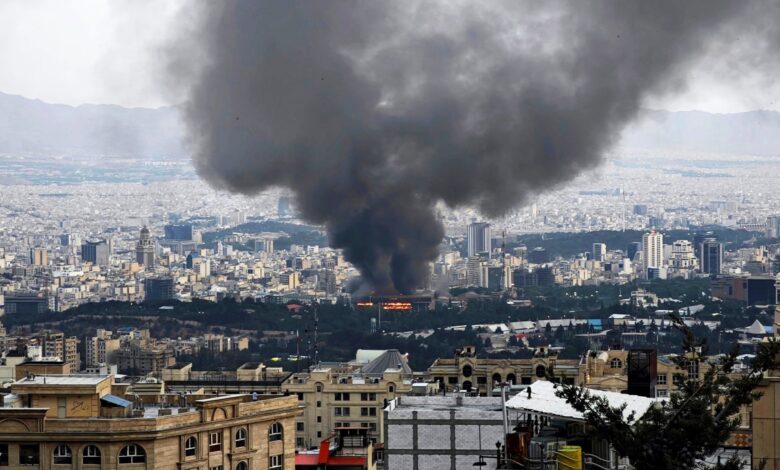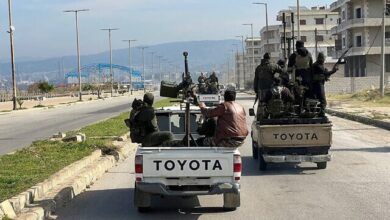Israel Hits Nuclear Sites, Iran Strikes Hospital as War Escalates

Israel bombed nuclear targets in Iran on Thursday and Iranian missiles hit an Israeli hospital overnight, as the week-old air war escalated with no sign yet of an off-ramp.
Following the strike which damaged the Soroka hospital in Israel’s southern city of Beersheba, Prime Minister Benjamin Netanyahu said Tehran’s “tyrants” would pay the “full price”.
His Defence Minister Israel Katz said the military had been instructed to intensify strikes on strategic-related targets in Tehran in order to eliminate the threat to Israel and destabilise the “Ayatollah regime”.
Netanyahu has said that Israel’s military attacks could result in the toppling of Iran’s leaders, and Israel would do whatever is necessary to remove the “existential threat” posed by Tehran.
U.S. President Donald Trump, meanwhile, has kept the world guessing about whether Israel’s superpower ally would join it in airstrikes.
Israel said on Thursday it had struck Iran’s Natanz and Isfahan nuclear sites. A military spokesperson initially said it had also hit Bushehr, site of Iran’s only functioning nuclear power plant, but a spokesperson later said this was a mistake to have said this.
Earlier, Israel said it had hit another nuclear site near Arak overnight, where Iran was building a heavy-water reactor.
Trump has veered from proposing a swift diplomatic end to the war to suggesting the United States might join it. On Wednesday he said nobody knows what he will do. A day earlier he mused on social media about killing Iran’s Supreme Leader Ali Khamenei, then demanded Iran’s unconditional surrender.
A week of Israeli air and missile strikes against its major rival has wiped out the top echelon of Iran’s military command, damaged its nuclear capabilities and killed hundreds of people, while Iranian retaliatory strikes have killed at least two dozen civilians in Israel.
REACTOR TARGETED
Earlier, the Israeli military said it targeted the Khondab nuclear site near Iran’s central city Arak overnight, including a partially-built heavy-water research reactor. Heavy-water reactors produce plutonium, which, like enriched uranium, can be used to make the core of an atom bomb.
The U.N. nuclear watchdog, the IAEA, said it had information that the heavy-water research reactor had been hit, but did not contain radioactive material. It had no information that a separate plant there which makes heavy water had been hit.
Israel, which has the most advanced military in the Middle East, has been fighting on several fronts since the Oct. 7, 2023 Hamas attack triggered the Gaza war. It has severely weakened Iran’s regional allies, the Palestinian militant group Hamas in Gaza and Lebanon’s Hezbollah, and bombed Yemen’s Houthis.
The extent of the damage inside Iran from the week-old bombing campaign has become far more difficult to assess in recent days, with the authorities apparently seeking to prevent panic by limiting information.
Iran has stopped giving updates on the death toll, and state media have ceased showing widespread images of destruction. The internet has been almost completely shut down. The public has been banned from filming, with the authorities citing a risk of espionage.
Arash, 33, a government employee in Tehran, said a building next to his home in Tehran’s Shahrak-e Gharb neighbourhood had been destroyed in the strikes.
“I saw at least three dead children and two women in that building. Is this how Netanyahu plans to ‘liberate’ Iranians? Stay away from our country,” he told Reuters by telephone.
Israel has issued evacuation orders for whole sections of Tehran, a city of 10 million. Thousands of residents have fled, jamming the highways out.
Samira, 11, had moved in with her grandparents in the northwestern city of Urmia, her family having fled Tehran when a shopping centre near their house was struck. She said she hasn’t been able to sleep at night.
“I’m afraid Israel will hit our home and my mom will die. I’m too scared. I just want to go home,” she said by phone.
Inside Israel, Iran’s retaliatory missile strikes over the past week have been the first time in decades of shadow war that a significant number of Iranian projectiles have pierced defences and killed Israelis in their homes.
The director general of the Israeli hospital that was damaged in Beersheba, Shlomi Kodesh, told reporters at the site that a missile strike had destroyed several wards and injured 40 people, mostly staff and patients.
“We’re trying to minimize the number of people at Soroka. At the moment, we don’t know if buildings may collapse or if wards might collapse,” he said.
Iran’s Revolutionary Guards said they were targeting Israeli military and intelligence headquarters located near the hospital. An Israeli military official denied there were military targets nearby and said the attack on a hospital was deliberate.
Missiles also hit a residential building in Ramat Gan, east of Tel Aviv.
“It’s very scary,” said Yaniv, 34, who lives nearby. He said he heard a deafening explosion when the missile hit, shaking his apartment tower.
REUTERS





